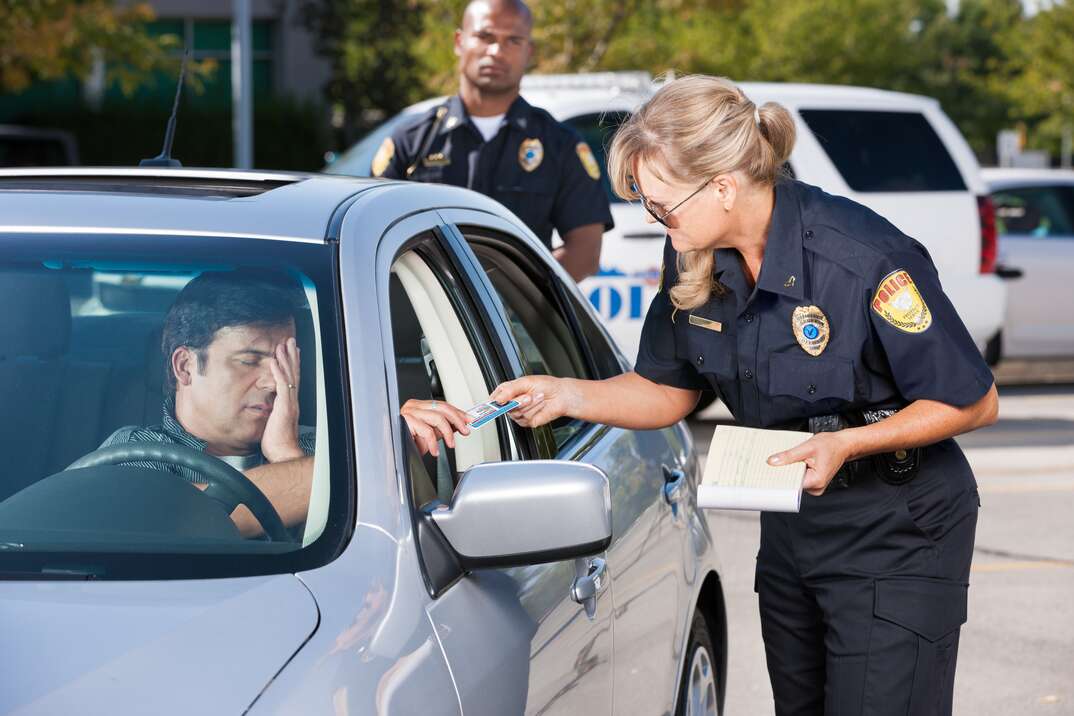- AppliancesElectriciansHVACLandscapingLocksmithPest ControlPlumbingRenovationRoofingT V RepairAll Home Improvement
- Car AccidentClass ActionCorporate LawCriminal DefenseDivorce LawEmployment LawFamily LawFinancial LawLegal AidMedical Injury LawyersMedical MalpracticeReal Estate LawWater Fire RestorationAll Legal
- InvestmentRetirementAll Finance
- Animal InsuranceAutoGeneral InsuranceHealth PolicyHome RentersAll Insurance
- DentalHealth SpecialistsAll Medical
- Animal CareVeterinaryAll Pets
- Auto GlassTowingAll Automotive
How Do Traffic Violation Points Work?

If you've ever been pulled over for speeding or other traffic violations, you likely have traffic violation points on your license.
The points system can be confusing, especially if it's your first time getting a traffic ticket. Understand how traffic violations and points work to ensure you maintain your driver's license.
Most, but not all, states use a traffic violation points system that assigns demerit points to your driving record when you get a moving violation. Different violations have different numerical values, which are added as points. More severe violations, such as reckless driving or DUI, add more points than minor tickets, such as not using your turn signal or going over the speed limit by a few miles per hour. If you accumulate enough points during a certain period, you can have your license suspended.
What Are Some Consequences of Having Points on Your License?
In many states, your license is eventually suspended if you receive too many points in a certain amount of time. The number of points and the period vary by state.
You might have other consequences before you reach the point of losing your license, including having to take a defensive driving course. You might also find your insurance rates go up as you accumulate traffic violation points. More traffic violations can indicate that you're a higher-risk driver, so your insurance company considers that when determining your rates.
You should be able to find information about the points system on your state’s DMV website. This database by FindLaw might be a good place to start.
You can also contact the DMV to find out about traffic violation points, including specific questions you have. State driver’s handbooks often contain information about the points system, and these can often be found through the DMV website.
Other reputable websites, local driving schools and attorneys can also provide information about the point system in your state. States vary in how many points they assign for different violations and when they start enforcing additional penalties, so understanding your state's system is important.
How Do I Know How Many Points Are on My License?
You can check your traffic violation points directly through the DMV. Some areas let you check online for free. Other states might require you to complete a request form that provides your information to get your points information by mail. If you check your points through a third-party vendor, you can expect to pay a fee for the service. If your state DMV requires you to request your point information via mail, using a third-party vendor is typically faster. You might also receive a warning letter from the DMV if your points are getting close to suspension level.
How Long Do Points Stay on Your Driving Record?
The length of time points stay on your driving record varies by state. In most states, your points fall off in 1 to 3 years for minor violations. However, some states count the points for a longer period, and the points for more severe violations stay on your license for longer. For example, in Iowa, points for minor violations count for five years, but points for a DUI count for 12 years.
Other states gradually decrease your points. In South Carolina, your points are cut in half after one year and don't count at all after two years. Oklahoma drivers get two points removed after every 12 months of no violations, with all points being removed after three consecutive years without violations. While the points might fall off, the actual violation usually remains on your driving record forever.
How Many Points Can Result in License Suspension?
Each state sets its guidelines for when a license gets suspended. The guidelines typically specify a number of points within a certain period. These numbers can vary significantly.
For example, in California, you can have your license suspended for accruing four points in 12 months, six points in 24 months or eight points in 36 months.
In Alaska, your license isn't suspended until you earn 12 points in 12 months or 18 points in 24 months.
Other states base it on the total balance. Arkansas residents can have their license suspended if the accumulated total reaches 14 points, with points expiring after 36 months.
The length of license suspension varies by state. Your history of traffic violations can also affect how long you lose your license. If it's your first time, the suspension period is often shorter than someone who repeatedly gets violations and has their license suspended.
Can You Have Points Taken Off Your License?
Most states automatically remove points after certain periods as they expire. In some states, you can go to traffic school to have traffic violation points removed or to avoid having them placed on your license at all.
Elocal Editorial Content is for educational and entertainment purposes only. The information provided on this site is not legal advice, and no attorney-client or confidential relationship is formed by use of the Editorial Content. We are not a law firm or a substitute for an attorney or law firm. We cannot provide advice, explanation, opinion, or recommendation about possible legal rights, remedies, defenses, options or strategies. The opinions, beliefs and viewpoints expressed by the eLocal Editorial Team and other third-party content providers do not necessarily reflect the opinions, beliefs and viewpoints of eLocal or its affiliate companies. Use of the Blog is subject to the
Website Terms and Conditions.The eLocal Editorial Team operates independently of eLocal USA's marketing and sales decisions.



